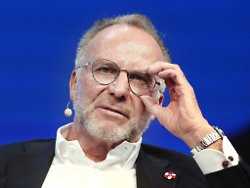“Can’t please UEFA”
Rummenigge and the “big problem of football”
03/29/2022, 6:27 p.m
Karl-Heinz Rummenigge will retire as boss of FC Bayern in the summer of 2021, but the long-standing chairman of the record champions is of course still part of the football business. Currently as a reminder and alleged fighter for fair competition.
Bayern Munich’s former CEO Karl-Heinz Rummenigge misses the consequences of the corona pandemic in football. “The big problem in football is that football is not willing to draw conclusions from these things,” said the 66-year-old on the TOMorrow podcast – the Business & Style podcast, adding: “Salaries are still rising, the Transfer fees continue to rise and any industry that ramps up budgets during a crisis will eventually have to foot the bill.”
In the summer of 2021, after two decades, Rummenigge handed over the chairmanship of the German record champions FC Bayern to Oliver Kahn. In the balance sheet for the “Corona season” 2020/2021, the record champions reported salary costs of 348.9 million euros for FC Bayern München AG last November – an increase of 11 percent compared to the previous season. Nevertheless, the club made a profit despite reduced income.
“Can’t please UEFA”
Rummenigge also takes UEFA to task. “I think it could now be the big hit, in which the clubs are given tools in terms of more serious financing, for example in terms of debt levels. Don’t spend more than you take in. That’s the point of financial fair play.” , said the 1980 European champion.
One problem is the English Premier League. “The Premier League is currently driving football, especially in Europe. They may be at the top level, but UEFA cannot agree that a league is now so dominant,” said Rummenigge, adding: “The only club that can keep up is a French club called Paris.”
He sees the 50+1 rules in Germany as “a huge, huge handicap”. The big question to ask yourself in the Bundesliga is “how long can we afford to have more tradition than competitiveness?” According to Rummenigge, “tradition is a great asset in our country, which is also very much appreciated by certain fans. But if we don’t get 50+1 into a right shape at some point so that investors can still invest in the Bundesliga, then the question arises how long the Bundesliga can maintain its competitiveness.” The international competitions would “only be decided on the transfer market,” said Rummenigge, “and we can’t keep up with the English.”
“Relic of Olden Days”
In the reigning Champions League winners FC Chelsea, the Russian Roman Abramowitsch, as the owner, pumped many billions of pounds into the squad over the past 20 years, in the end there was a great triumph – and huge concern for the future: Because of his closeness to the Russian President Vladimir Putin was personally sanctioned by the British government recently. Abramovich has to sell the club, the Champions League winner can only continue playing with a special permit. The expenses must be radically capped until a sale, the departure of several top performers in the summer is probably unavoidable.
The 50+1 rule is seen by fans and many officials as a bastion against the unbridled influence of investors on the competition. When the rule was introduced in 1998, the DFB had formulated the main goals of the rule as “formulated that “the organizational connection between competitive sport (licensed teams) and popular sport remains guaranteed” and “to make the spin-off as neutral as possible for the competitive situation in the federal leagues and the association structures”. is.” For Rummenigge, the rule is simply “a relic from the old days.”
The Premier League is under pressure because investors come into the league due to weak, rather non-existent requirements, and there are at least legitimate doubts about their moral integrity. Traditional club Newcastle United recently acquired a Saudi sovereign wealth fund that is directly linked to Crown Prince Mohammed bin Salman. Shortly after the start of the Russian attack on Ukraine, this led to the enormously embarrassing match between Abramovich’s club Chelsea and Newcastle United for the league and the investment by the sheikhs, who had had 81 people publicly beheaded a few days earlier. It was the bloodiest day in the history of the Kingdom of Saudi Arabia.
